Welcome to the Thursday, April 20, Brew.
Here’s what’s in store for you as you start your day:
- A look at partisanship in the 2023 mayoral elections
- Update on this year’s and next year’s ballot measure certifications
- Staff Writer Paul Rader tackles the topic of off-cycle elections in the latest episode of On the Ballot, our weekly podcast
Tracking partisanship in the 2023 mayoral elections
Forty mayoral elections are taking place in the 100 largest U.S. cities and the 50 state capitals in 2023.
Ballotpedia has tracked the partisan affiliation of the mayors of the 100 largest U.S. cities since 2016, and we’ve tracked the partisan affiliation of state capital mayors since 2021. Let’s take a look at what we’ve found.
Thirty-three of the 40 mayoral elections we’re covering this year hold nonpartisan elections, and seven hold partisan elections. In cities where mayoral elections are nonpartisan, we use one or more of the following sources to identify each officeholder’s partisan affiliation:
- Direct communication from the officeholder,
- Previous candidacy for partisan office, or
- Identification of partisan affiliation by multiple media outlets.
Top-100 largest cities
Twenty-nine of the 100 largest U.S. cities are holding mayoral elections in 2023. Currently, 20 of those cities have a Democratic mayor, six have a Republican mayor, two mayors are independent or nonpartisan, and one mayor’s partisan affiliation is unclear. Partisan control of the mayor’s office has not changed in the three races that have occurred so far.
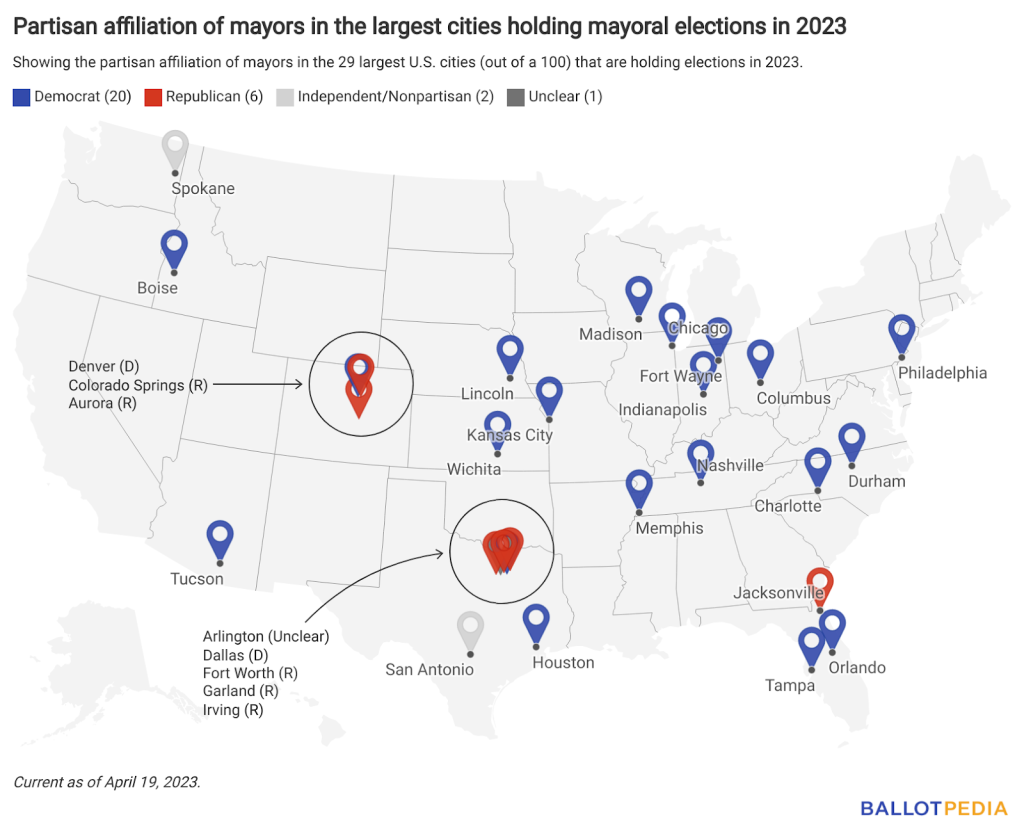
Across the country, Democrats hold 62 top-100 mayoral offices, Republicans hold 26, independents hold three, and nonpartisan mayors hold seven. Two mayors’ partisan affiliations are unclear.
Since Ballotpedia began tracking mayoral partisanship in 2016, the number of Democratic mayors in the top 100 cities has ranged from 61 (in 2019) to 67 (in 2016). The number of Republican mayors has ranged from 25 (in 2021) to 30 (in 2019).
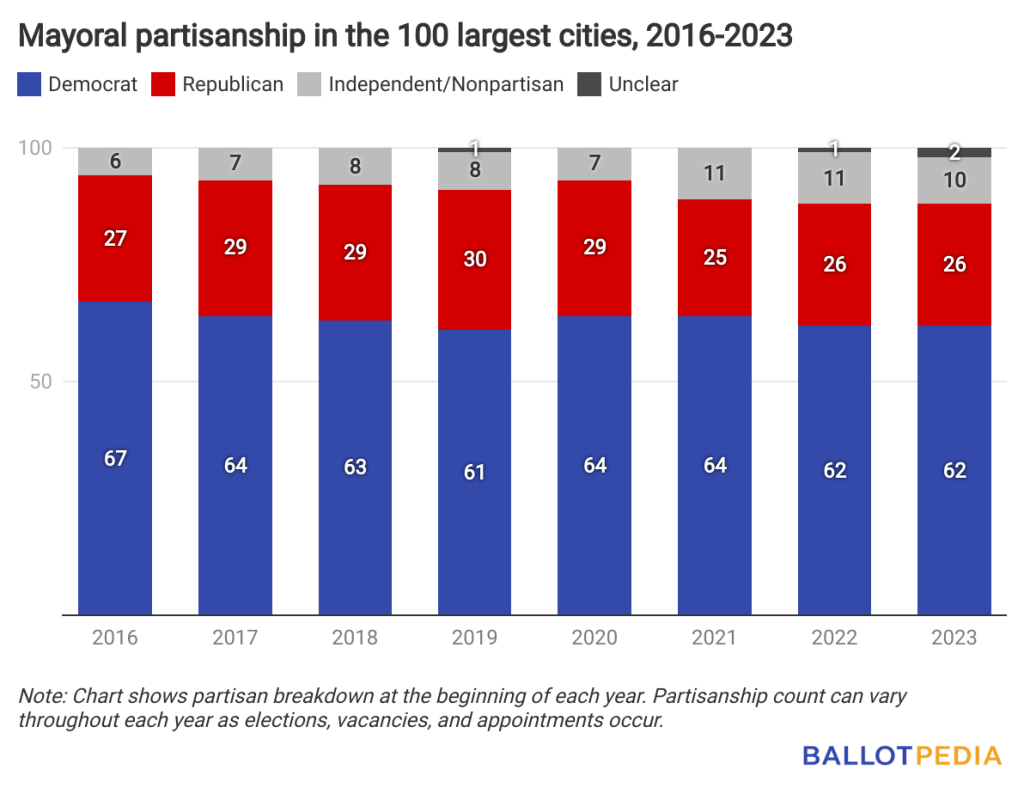
State capitals
Eighteen state capitals are holding mayoral elections in 2023, including 11 capitals that fall outside of the top 100 cities. Heading into the year, 15 of those capitals had a Democratic mayor, one had a Republican mayor, one mayor was nonpartisan, and one mayor’s partisan affiliation was unclear.
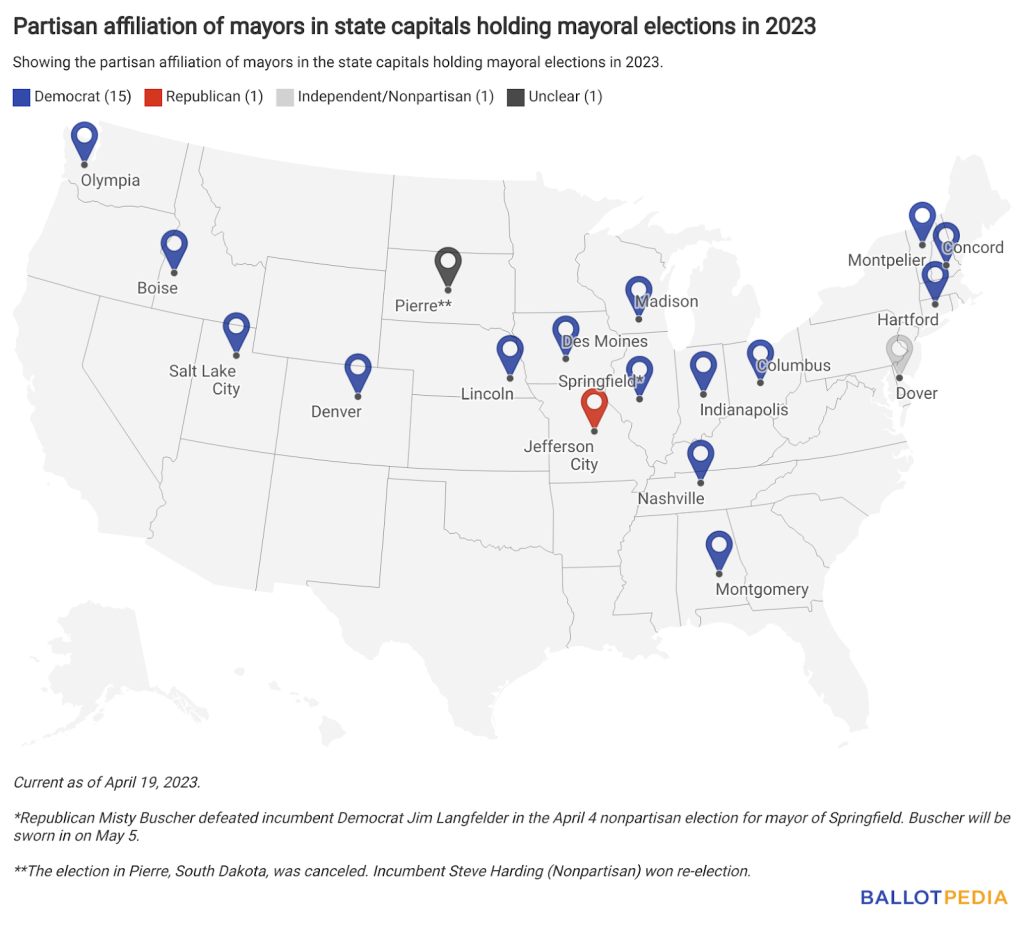
Five state capital elections have taken place so far in 2023 and one resulted in a mayoral office changing party control. In the April 4 nonpartisan election for mayor of Springfield, Illinois, Republican Misty Buscher defeated incumbent Democrat Jim Langfelder. Buscher will be sworn in on May 5.
As Buscher has not yet assumed office, there are currently 38 Democratic state capital mayors, four Republican mayors, one independent mayor, two nonpartisan mayors, and five mayors with unclear partisan affiliation.
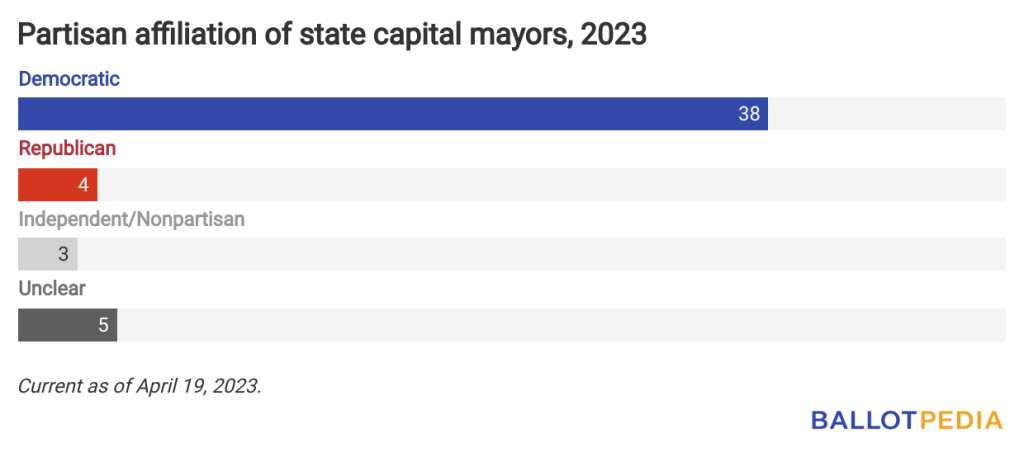
Update on this year’s and next year’s ballot measure certifications
As of April 18, 2023, six statewide measures have been certified for the ballot in four states for elections in 2023. That’s the same as the average number (6) certified at this point in other odd-numbered years from 2011 to 2021.
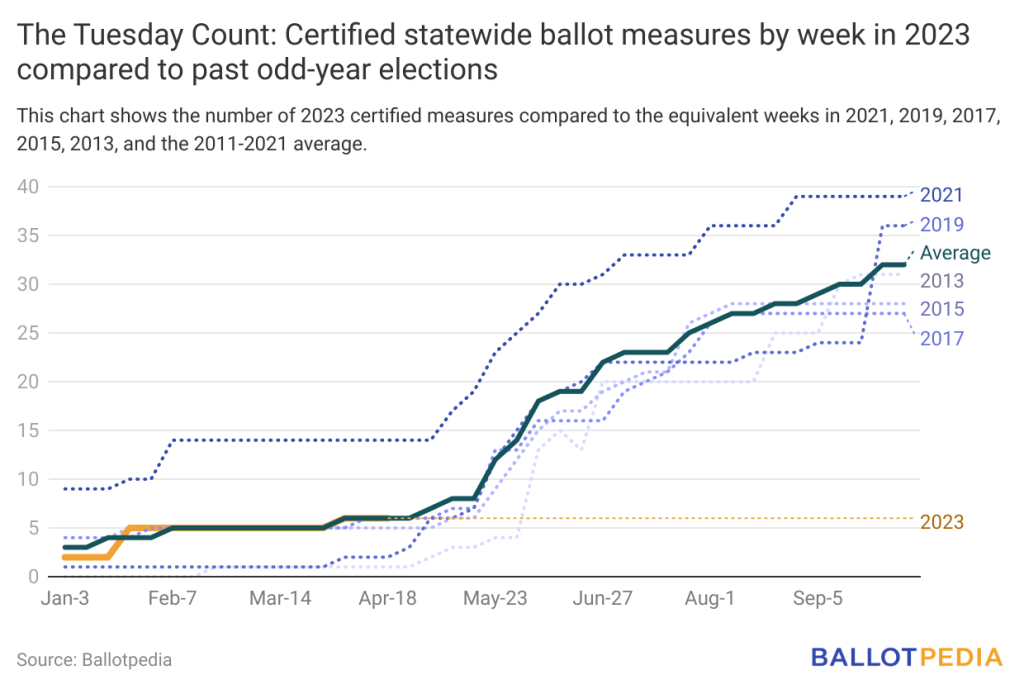
For 2024, 28 statewide measures have been certified in 16 states. That’s 10 more measures than the average number certified at this point from 2010 to 2022.
Here’s an update on the latest activity.
Three new measures were certified for the 2024 ballot last week:
- Arkansas Lottery Proceed Funding for Vocational-Technical School Scholarships and Grants Amendment
- Colorado Property Tax Exemption for Veterans with Individual Unemployability Status Amendment
- North Dakota Single-Subject Requirement for Initiatives and Require Constitutional Initiatives to be Passed Twice Amendment
Signatures have been submitted and are pending verification for one initiative in Michigan:
Signatures were verified for five indirect initiatives in Maine and Ohio, and the initiatives are now before legislators:
- Maine “Right to Repair Law” Vehicle Data Access Requirement Initiative (2023)
- Maine Creation of Pine Tree Power Company Initiative (2023)
- Maine Prohibit Foreign Spending in Elections Initiative (2023)
- Maine Voter Approval of Borrowing Above $1 Billion by State Entities and Electric Cooperatives Initiative (2023)
- Ohio Marijuana Legalization Initiative (2023)
From 2011 to 2021, the average number of statewide ballot measures certified in an odd-numbered year was 33. By this time during odd-numbered years from 2011 through 2021, an average of six statewide measures had been certified.
Staff Writer Paul Rader tackles the topic of off-cycle elections in the latest episode of On the Ballot, our weekly podcast
On the Ballot, our weekly podcast, takes a closer look at the week’s top political stories.
In this week’s episode, host Victoria Rose and Staff Writer Paul Rader tackle the topic of off-cycle elections. What are they? How do you define off-cycle elections? And which offices are typically on the ballot in these elections? If you’re looking for answers to these questions and more, be sure to tune in to this week’s episode!
New episodes of On the Ballot come out Thursday afternoons, so if you’re reading this on the morning of April 20, you’ve still got time to subscribe to On the Ballot on your favorite podcast app before this week’s episode comes out!
Click below to listen to older episodes and find links to where you can subscribe.
Learn More






